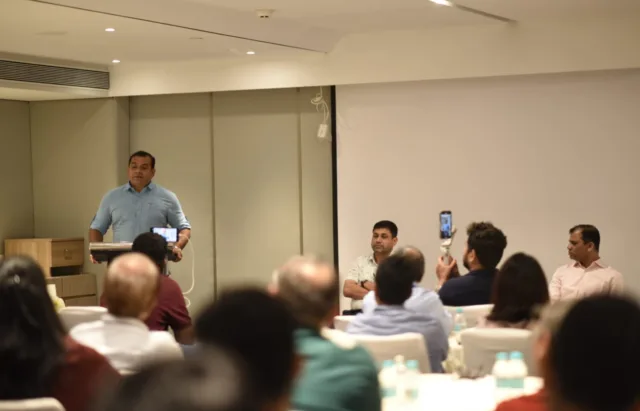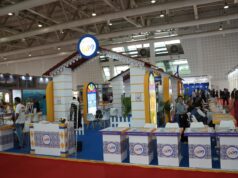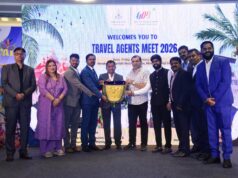Department of Information Technology, Electronics, and Communications of the Government of Goa hosted the “Bridging Success: Industry & Academia Alliance” event at Taj Vivanta, Panaji, recently. The event was graced by IT & Tourism Minister Rohan A. Khaunte, alongside Dr. Chandrakant Shetye, Chairman of ITG, Praveen Volvotkar, MD of ITG, Neville Noronha, OSD to the Minister of ITE&C, D S Prashant, CEO of Startup and IT Promotion Cell and Priyatama Patil, Assistant Director of ITE&C.
This gathering brought together Goa’s industry leaders and academic stalwarts from esteemed institutions. Central to the discussions were pinpointing the recruitment challenges experienced by reputed companies in Goa and exploring strategies to align the skills and knowledge imparted by academic institutions with the evolving demands of the industry. By convening key stakeholders, the event aimed to create actionable strategies and fortify partnerships that will promote innovation and propel growth in Goa.
In his address to the gathering, Khaunte articulated the vision for Goa to establish a robust and dynamic ecosystem where government, academia, and industry work hand in hand. “By fostering collaboration and continuous dialogue, we can align educational curricula with industry standards, ensuring that our graduates are industry-ready. Our mission is to ensure zero brain drain by offering ample opportunities for our youth within the state, enabling them to stay connected to their roots while contributing to our collective progress. Through initiatives like skilling, reskilling, and upskilling, we aim to bridge the gap between job-seekers and job-givers, making Goa a hub for quality employment and technological innovation.”
Further, reflecting on the journey since 2017 Khaunte stated that when initiating the IT and startup policies, they have witnessed the power of collaboration. These policies are the joint efforts of government, academia, and industry, and have laid the foundation for a future where Goa can harness its full potential in the digital era. “A key aspect of our strategy has been focusing on creating employment opportunities. The recruitment assistance program, which provided financial incentives to companies hiring local talent, has already shown promising results. The apprentice scheme introduced has shown potential, offering practical training and exposure to our youth. Our efforts extend to integrating cutting-edge programs and labs, such as the 5G lab, into our educational institutions. These initiatives, supported by central government investments, aim to make our youth industry-ready.”
The discussions led to several key takeaways and initiatives aimed at strengthening the collaboration between industry and academia. Firstly, the creation of a unifying motto like “Get the first job in Goa” was proposed to inspire and direct efforts towards local employment. Emphasizing the importance of academic institutions having easy access to relevant industry information, the goal is to better prepare students for the job market. Regular industry sessions were recommended, where experts can share insights and current trends with students and faculty. There was a strong emphasis on updating and aligning academic curricula with current industry standards and technological advancements to ensure graduates are well-prepared for employment.
A digital platform for sharing ideas and collaborating on projects was suggested to facilitate continuous dialogue between students, faculty, and industry professionals. Adjusting internship timelines to better align with academic schedules and industry needs was discussed, with the goal of achieving 100% placements through a combination of internships and apprenticeships set as an aspirational target.
Addressing the challenges students face when applying for jobs in startups, such as lack of awareness and preparation, and encouraging placement departments to actively respond to startup requests and facilitate smoother communication channels were identified as priorities.
Enhancing access to and functionality of employment exchange portals for students was also suggested. Regular industry talks focused on the latest technologies and practices were recommended to keep students informed of current industry trends.
Strengthening existing industry-institute connect programs, developing new initiatives to enhance collaboration, and implementing training programs for faculty to familiarise them with the latest technologies, industry practices, and modern vernacular and languages were emphasised. Utilizing employer branding and Corporate Social Responsibility (CSR) initiatives to enhance teaching quality and resources was considered a valuable strategy. Finally, creating stronger Memorandums of Understanding (MoUs) between industry and academia to facilitate better placements and collaborative efforts was emphasized as a vital step toward achieving these goals.
This event was the beginning of the renewed effort to transform Goa into a hub of innovation, talent and opportunities and to strengthen a robust ecosystem where academic excellence and industry innovation synergize, elevating Goa’s IT sector to unprecedented heights.






